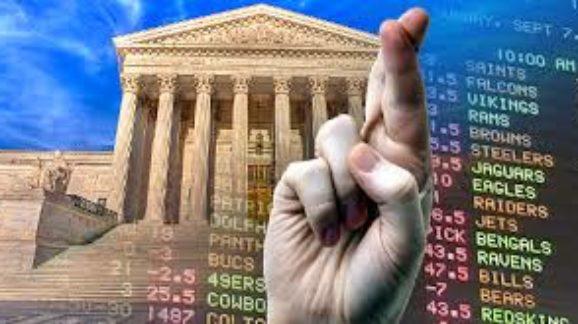How the Supreme Court’s Ruling Transformed Sports Betting Across the U.S.
Historic Supreme Court Verdict Spurs Nationwide Sports Betting Legalization
In a groundbreaking 2018 decision, the U.S. Supreme Court dismantled the federal prohibition on sports betting, empowering individual states to legalize and regulate sports wagering independently. This ruling nullified the Professional and Amateur Sports Protection Act (PASPA) of 1992, which had confined legal sports betting to just a few states for over 25 years. By removing this federal barrier, the Court paved the way for a surge of state-level legislation, unlocking new economic opportunities and regulatory challenges across the country.
Experts forecast rapid expansion of legalized sports betting markets,highlighting several key advantages that appeal to policymakers and investors alike:
- Boost to Local Economies: States can tap into ample tax revenues to fund public programs and infrastructure.
- Enhanced Consumer Protections: Legal markets introduce safeguards against fraud and unfair practices.
- Advancements in Digital Platforms: Growth in mobile and online betting technologies increases accessibility and engagement.
| State | Legal Status (2018) | Annual Revenue Projection |
|---|---|---|
| New Jersey | Legalized | $220 Million |
| Nevada | Established Market | $520 Million |
| Colorado | Pending Legislation | $130 Million (Estimate) |
Economic Impact and Regulatory Evolution in States
The Supreme Court’s decision has catalyzed a profound economic change in many states. Freed from federal constraints, states are now capitalizing on sports betting as a lucrative revenue source, channeling funds into education, healthcare, and infrastructure growth. To manage this growth responsibly, states have crafted detailed regulatory frameworks that balance market expansion with consumer safety and fairness.
Key elements of these evolving regulations include:
- Thorough Licensing: Rigorous vetting ensures operators meet high standards of integrity and reliability.
- Player Protection Measures: Tools like self-exclusion programs and betting limits help mitigate problem gambling.
- Balanced Tax Structures: Tax rates are designed to maximize public benefit without discouraging market participation.
- Strong Enforcement: Dedicated agencies oversee compliance and impose penalties for violations.
| State | 2023 Estimated Revenue | Sports Betting Tax Rate | Regulatory Authority |
|---|---|---|---|
| New Jersey | $460 million | 15% | Division of Gaming Enforcement |
| Pennsylvania | $340 million | 34% | Gaming Control Board |
| Illinois | $290 million | 15% | Gaming Board |
Legal Complexities and Industry Adaptations Post-Ruling
In the wake of the Supreme Court’s decision, states have encountered a multifaceted legal environment as they develop and refine their sports betting regulations. Issues such as defining permissible betting activities, licensing protocols, and revenue-sharing agreements with professional sports leagues have sparked legal debates. Additionally, tribal casinos and existing operators have asserted their rights under prior agreements, leading to ongoing litigation that seeks to clarify jurisdictional boundaries and market access.
The industry has responded dynamically, with stakeholders embracing innovation and strategic alliances. Leading sportsbook companies have launched aggressive marketing campaigns to capture market share, while sports leagues have negotiated lucrative data and sponsorship deals to protect the integrity of their games and maximize revenue streams. Key responses include:
| Stakeholder | Primary Action | Resulting Impact |
|---|---|---|
| State Governments | Enacted swift legislation and licensing | Surge in tax revenues |
| Tribal Casinos | Negotiated compacts to protect exclusivity | Preserved market share |
| Sports Leagues | Secured data rights and sponsorships | Strengthened game integrity |
| Operators | Expanded market presence and marketing | Accelerated customer growth |
- Regulatory diversity has increased as states tailor unique approaches to sports betting governance.
- Collaboration between leagues and operators is shaping the future of the industry’s ecosystem.
- Heightened focus on responsible gambling accompanies the rapid market expansion.
Strategic Guidance for Policymakers and Industry Participants
To fully leverage the opportunities presented by legalized sports betting, policymakers must establish clear, clear, and enforceable regulations that prioritize consumer protection and market integrity. Emphasizing responsible gambling programs is essential to protect at-risk individuals, including youth and those susceptible to addiction. Collaboration among regulators, operators, and advocacy groups is vital to develop best practices that balance economic benefits with social obligation.
Additional recommendations include:
- Standardizing licensing criteria to ensure consistent market oversight and prevent illicit operations.
- Promoting technological advancements to enhance security, user experience, and data analytics capabilities.
- Encouraging interstate cooperation for cross-border betting regulation and data sharing.
- Supporting ongoing research to assess the social and economic impacts of legalized sports wagering.
| Stakeholder | Core Responsibility | Focus Area |
|---|---|---|
| Policymakers | Legislative oversight | Regulatory clarity and enforcement |
| Operators | Compliance with laws | Player safety and fair play |
| Advocacy Groups | Public education | Responsible gambling awareness |
| Researchers | Data collection and analysis | Impact evaluation |
Final Thoughts
The Supreme Court’s landmark ruling has irrevocably altered the trajectory of sports betting in the United States, dismantling long-standing federal restrictions and empowering states to chart their own regulatory courses.As legalization spreads, the industry is poised for substantial growth, bringing economic benefits, regulatory challenges, and new opportunities for innovation. Stakeholders across the spectrum will continue to shape this evolving landscape, ensuring that sports betting becomes a well-regulated, responsible, and integral part of the American gaming environment.




